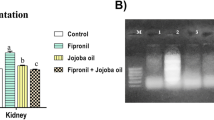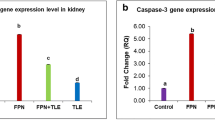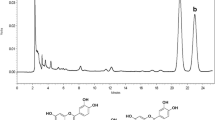Abstract
Fipronil (FPN) is a relatively new and broad spectrum insecticide that induces toxic effects to animals and humans through induction of oxidative stress. Ginseng is a medicinal plant that has antioxidant, anti-inflammatory, and anti-apoptotic activities. Thus, the current study was conducted to evaluate the anti-toxic potential of ginseng aqueous extract (GAE) against FPN-induced hepatorenal toxicity in rats. Thirty-two male Wistar albino rats were randomly allocated into four equal groups. Rats of the control group received distilled water. The second group was administrated with GAE at a dose of 200 mg/kg b.w. orally day by day for 6 weeks. The third group was intoxicated with FPN at a dose of 4.85 mg/kg b.w. orally day by day for 6 weeks. The fourth group was administrated with GAE 2 h before FPN intoxication. Intoxication of rats with FPN significantly elevated the activities of serum alanine aminotransferase and aspartate aminotransferase and serum levels of urea and creatinine, as well as increased malondialdehyde level and protein expressions of caspase-3 and cyclooxygenase-2 in hepatic and renal tissues. However, it significantly decreased hepatic and renal GSH content and catalase activity. In addition, it induced histopathological alterations in hepatic and renal tissue architectures. Conversely, concomitant oral administration of GAE ameliorated the FPN-induced biochemical, pathological, and histochemical alterations in both hepatic and renal tissues. This study indicated that ginseng attenuates FPN-induced hepatorenal toxicity, possibly via its antioxidant, anti-apoptotic, and anti-inflammatory properties.

CAL ABSTRACTPHIRAG






Similar content being viewed by others
References
Abdel-Fattah SM, Safaa MA, Sanad MI, Helal AD, Sarfinaz S, Abd ElGhany Ragaa F, Ghanem F (2014) Biochemical and histochemical studies on white ginseng roots for ameliorating aflatoxicosis in rats. Int J Curr Microbiol App Sci 3(10):458–473
Abdel-Daim MM, Abdeen A (2018) Protective effects of rosuvastatin and vitamin E against fipronil-mediated oxidative damage and apoptosis in rat liver and kidney. Food Chem Toxicol 114:69–77. https://doi.org/10.1016/j.fct.2018.01.055
Abdel-Wahhab MA, Ahmed HH (2004) Protective effects of Korean Panax ginseng against chromium VI toxicity and free radical generation in rats. J Ginseng Res 28:11–17. https://doi.org/10.5142/JGR.2004.28.1.011
Abouelghar GE, El-Bermawy ZA, Salman HMS (2020) Oxidative stress, hematological and biochemical alterations induced by sub-acute exposure to fipronil (COACH®) in albino mice and ameliorative effect of selenium plus vitamin E. Environ Sci Pollut Res 27:7886–7900. https://doi.org/10.1007/s11356-019-06579-9
Adedara A, Teberen R, Ebokaiwe AP, Ehwerhemuepha T, Farombi EO (2012) Induction of oxidative stress in liver and kidney of rats exposed to Nigerian bonny light crude oil. Environ Toxicol 27(6):372–379. https://doi.org/10.1002/tox.20660
Aebi H (1984) Catalase in vitro. Methods Enzymol 105:121–126. https://doi.org/10.1016/s0076-6879(84)05016-3
Ahuja A, Kim JH, Kim JH, Yi YS, Cho JY (2018) Functional role of ginseng-derived compounds in cancer. J Ginseng Res 42(3):248–254. https://doi.org/10.1016/j.jgr.2017.04.009
Al-Hazmi MA, Rawi SM, Arafa NM, Wagas A, Montasser AO (2015) The potent effects of ginseng root extract and memantine on cognitive dysfunction in male albino rats. Toxicol Ind Health 31(6):494–509. https://doi.org/10.1177/0748233713475517
Badgujar PC, Chandratre GA, Pawar NN, Telang AG, Kurade NP (2015a) Fipronil induced oxidative stress involves alterations in SOD1 and catalase gene expression in male mice liver: protection by vitamins E and C. Environ Toxicol 31(9):1147–1158. https://doi.org/10.1002/tox.22125
Badgujar PC, Pawar NN, Chandratre GA, Telang AG, Sharma AK (2015b) Fipronil induced oxidative stress in kidney and brain of mice: protective effect of vitamin E and vitamin C. Pestic Biochem Physiol 118:10–18. https://doi.org/10.1016/j.pestbp.2014.10.013
Badgujar PC, Selkar NA, Chandratre GA, Pawar NN, Dighe VD, Bhagat ST, Telang AG, Vanage GR (2016) Fipronil-induced genotoxicity and DNA damage in vivo: protective effect of vitamin E. Hum Exp Toxicol 36(5):508–519. https://doi.org/10.1177/0960327116655388
Bak MJ, Mira J, Woo-Sik J (2012) Antioxidant and hepatoprotective effects of the red ginseng essential oil in H2O2-treated HepG2 cells and CCl4-treated mice. Int J Mol Sci 13(2):2314–2330. https://doi.org/10.3390/ijms13022314
Bancroft JD, Gamble M (2008) Theory and Practice of histological techniques. 6th Edition. Churchill, Livingstone, New York, London. 440-450
Barbieri SS, Eligini S, Brambilla M, Tremoli E, Colli S (2003) Reactive oxygen species mediate cyclooxygenase-2 induction during monocyte to macrophage differentiation: critical role of NADPH oxidase. Cardiovasc Res 60(1):187–197. https://doi.org/10.1016/S0008-6363(03)00365-1
Beutler EK, Duron O, Kefly BM (1963) Improved method for the determination of blood glutathione. J Lab Clin Med 61:882–888
Das PC, Cao Y, Cherrington N, Hodgson E, Rose RL (2006) Fipronil induces CYP isoforms and cytotoxicity in human hepatocytes. Chem Biol Interact 164(3):200–214. https://doi.org/10.1016/j.cbi.2006.09.013
El-Ballal SS, Amer HA, Tahoun EA, EL-Borai NB, Abuo Zahra MA (2019) Bee pollen alleviates fipronil and emamectin benzoate induced- hepatorenal toxicity in rats. Assiut Vet Med J 65(161):164–173
El-Bialy BES, Abd Eldaim MA, Hassan A, Abdel-Daim MM (2020) Ginseng aqueous extract ameliorates lambda-cyhalothrin-acetamiprid insecticide mixture for hepatorenal toxicity in rats: role of oxidative stress-mediated proinflammatory and proapoptotic protein expressions. Environ Toxicol 35:124–135. https://doi.org/10.1002/tox.22848
Fawcett JK, Soctt JE (1960) A rapid and precise method for the determination of urea. J Clin Pathol 13(2):156–159. https://doi.org/10.1136/jcp.13.2.156
Gunasekara AS, Truong T, Goh KS, Spurlock F, Tjeerdema RS (2007) Environmental fate and toxicology of fipronil. J Pestic Sci 32:198–199. https://doi.org/10.1584/jpestics.R07-02
Hu YP, Peng YB, Zhang YF, Wang Y, Yu WR, Yao M, Fu XJ (2017) Reactive oxygen species mediated prostaglandin E2 contributes to acute response of epithelial injury. 4123854:8 . https://doi.org/10.1155/2017/4123854
Hussein J, El-Khayat Z, Ramzy T, Ashour M, Oraby F (2011) Protective effect of Panax ginseng against Streptozotocin induced renal dysfunction in rats. J Appl Sci Res 7(10):1419–1423
Jakob S, Corazza N, Diamantis E, Kappeler A, Brunner T (2008) Detection of apoptosis in vivo using antibodies against caspase-induced neo-epitopes. Methods 44(3):255–261. https://doi.org/10.1016/j.ymeth.2007.11.004
Kang KS, Kim HY, Yamabe N, Nagai R, Yokozawa T (2006) Protective effect of sun ginseng against diabetic renal damage. Biol Pharm Bull 29(8):1678–1684. https://doi.org/10.1248/bpb.29.1678
Kang KS, Kim HY, Baek SH, Yoo HH, Park JH, Yokozawa T (2007) Study on the hydroxyl radical scavenging activity changes of ginseng and ginsenoside-Rb2 by heat processing. Biol Pharm Bull 30:724–728. https://doi.org/10.1248/bpb.30.724
Kasarala G, Tillmann HL (2016) Standard liver tests. Clin Liver Dis 8:13–18. https://doi.org/10.1002/cld.562
Ki YW, Lee JE, Park JH, Shin IC, Koh HC (2012) Reactive oxygen species and mitogen-activated protein kinase induce apoptotic death of SH-SY5Y cells in response to fipronil. Toxicol Lett 211:18–28. https://doi.org/10.1016/j.toxlet.2012.02.022
Kim JK, Tabassum N, Uddin MR, Park SU (2016) Ginseng: a miracle sources of herbal and pharmacological uses. Orient Pharm Exp Med 16:243–250. https://doi.org/10.1007/s13596-016-0246-6
King MS, Adler MD, Murphy LL (2006) Extraction-dependent effects of American ginseng (Panax quinquefolium) on human breast cancer cell proliferation and estrogen receptor activation. Integr Cancer Ther 5(3):236–243. https://doi.org/10.1177/1534735406291341
Lee CH, Kim JH (2014) A review on the medicinal potentials of ginseng and ginsenosides on cardiovascular diseases. J Ginseng Res 38(3):161–166. https://doi.org/10.1016/j.jgr.2014.03.001
Lin F, Prichard J (2015) Handbook of practical immunohistochemistry. Springer, New York
Liu PF, Hu YC, Kang BH, Tseng YK, Wu PC, Liang CC, Hou YY, Fu TY, Liou HH, Hsieh IC, Ger LP, Shu CW (2017) Expression levels of cleaved caspase-3 and caspase-3 in tumorigenesis and prognosis of oral tongue squamous cell carcinoma. PLoS One 12(7):e0180620. https://doi.org/10.1371/journal.pone.0180620
Lopez O, Hernandez AF, Rodrigo L, Gil F, Pena G, Serrano JL, Parron T, Villanueva E, Pla A (2007) Changes in antioxidant enzymes in humans with long-term exposure to pesticides. Toxicol Lett 171(3):146–153. https://doi.org/10.1016/j.toxlet.2007.05.004
Magalhães J, Sandini T, Berto Udo M, Fukushima A, Spinosa H (2018) Fipronil: uses, pharmacological and toxicological features. Revinter 11(1):67–83. https://doi.org/10.22280/revintervol11ed1.344
Majno G, Joris I (1995) Apoptosis, oncosis, and necrosis: an overview of cell death. Am J Clin Pathol 146(1):3–15
Mansour HH (2013) Protective effect of ginseng against gamma-irradiation-induced oxidative stress and endothelial dysfunction in rats. EXCLI J 12:766–777
Marnett LJ (1999) Lipid peroxidation-DNA damage by malondialdehyde. Mutat Res Fundam Mol Mech Mutagen 424(1–2):83–95. https://doi.org/10.1016/s0027-5107(99)00010-x
Morsy F, el Din A, Farrag A, Farrag H, Badawi M, Shaffie N (2012) Ochratoxin a toxic effect on rat kidneys and the potential protective effect of ginseng: histopathologic, histochemical, and image analysis morphometric studies. Maced J Med Sci 5(1):40–48. https://doi.org/10.3889/MJMS.1857-5773.2012.0195
Mossa AH, Swelam ES, Mohafrasha SMM (2015) Sub-chronic exposure to fipronil induced oxidative stress, biochemical and histopathological changes in the liver and kidney of male albino rats. Toxicol Rep 2:775–784. https://doi.org/10.1016/j.toxrep.2015.02.009
Nabavi SM, Nabavi SF, Eslami S, Moghaddam AH (2012) In vivo protective effects of quercetin against sodium fluoride-induced oxidative stress in the hepatic tissue. Food Chem 132(2):931–935. https://doi.org/10.1016/j.foodchem.2011.11.070
Narita M, Shimamura M, Imai S, Kubota C, Yajima Y, Takagi T, Shiokawa M, Inoue T, Suzuki M, Suzuki T (2008) Role of interleukin-1beta and tumor necrosis factor-alpha-dependent expression of cyclooxygenase-2 mRNA in thermal hyperalgesia induced by chronic inflammation in mice. Neuroscience. 152(2):477–486. https://doi.org/10.1016/j.neuroscience.2007.10.039
Ohkawa H, Ohishi W, Yagi K (1979) Assay for lipid peroxides in animal tissues by thiobarbituric acid reaction. Anal Biochem 95(2):351–358. https://doi.org/10.1016/0003-2697(79)90738-3
Park SJ, Lee JR, Jo MJ, Park SM, Ku SK, Kim SC (2013) Protective effects of Korean red ginseng extract on cadmium-induced hepatic toxicity in rats. J Ginseng Res 37(1):37–44. https://doi.org/10.5142/jgr.2013.37.37
Park JH, Park YS, Lee JB, Park KH, Paik MK, Jeong M, Koh HC (2016) Meloxicam inhibits fipronil-induced apoptosis via modulation of the oxidative stress and inflammatory response in SH-SY5Y cells. J Appl Toxicol 36(1):10–23. https://doi.org/10.1002/jat.3136
Parke DV, Piotrowski JK (1996) Glutathione: its role in detoxication of reactive oxygen species and environmental chemicals. Toxicol 4:1–13
Qin F, Gao Y, Xu P, Guo B, Li J, Wang H (2015) Enantioselective bioaccumulation and toxic effects of fipronil in the earthworm Eisenia foetida following soil exposure. Pest Manag Sci 71(4):553–561. https://doi.org/10.1002/ps.3841
Raheem SA, Meselhy AR, Hafiez SA, Naby NA (2017) Evaluation of the protective effect of ginseng against gentamicine-induced nephrotoxicity in adult, albino rats: a histochemical and immunohistochemical study. Al Azhar Assiut Med J 15(1):35–42. https://doi.org/10.4103/AZMJ.AZMJ_4_17
Rahman MA, Dhar DK, Yamaguchi E, Maruyama S, Sato T, Hayashi H, Ono T, Yamanoi A, Kohno H, Nagasue N (2001) Coexpression of inducible nitric oxide synthase and COX-2 in hepatocellular carcinoma and surrounding liver: possible involvement of COX-2 in the angiogenesis of hepatitis C virus-positive cases. Clin Cancer Res 7(5):1325–1332
Raquel P, Tercariol G, Godinho AF (2011) Behavioral effects of acute exposure to the insecticide fipronil. Pestic Biochem Physiol 99(3):221–225. https://doi.org/10.1016/j.pestbp.2010.12.007
Reitman S, Frankel S (1957) Colorimetric determination of serum oxalacetic and glutamic pyruvic transaminase. Amer J Clin Pathol 28(1):56–63. https://doi.org/10.1093/ajcp/28.1.56
Salminen LE, Paul RH (2014) Oxidative stress and genetic markers of suboptimal antioxidant defense in the aging brain: a theoretical review. Rev Neurosci 25(6):805–819. https://doi.org/10.1515/revneuro-2014-0046
Schirmeister J, Willmman H, Kiefer H (1964) Plasma creatinine as rough indicator of renal function. Dtsch Med Wschr 89:1940–1947
Scibior D, Czeczot H (2006) Catalase: structure, properties, functions. Postepy Hig Med Dosw (Online) 60:170–180
Silva M, Pham N, Lewis C, Iyer S, Kwok E, Solomon G, Zeise L (2015) A comparison of ToxCast test results with in vivo and other in vitro endpoints for neuro, endocrine, and developmental toxicities: a case study using endosulfan and methidathion. Birth Defects Res B Dev Reprod Toxicol 104(2):71–89. https://doi.org/10.1002/bdrb.21140
Simon-Delso N, Amaral-Rogers V, Belzunces LP, Bonmatin JM, Chagnon M, Downs C, Furlan L, Gibbons DW, Giorio C, Girolami V, Goulson D, Kreutzweiser DP, Krupke CH, Liess M, Long E, McField M, Mineau P, Mitchell EAD, Morrissey CA, Noome DA, Pisa L, Settele J, Stark JD, Tapparo A, van Dyck H, van Praagh J, van der Sluijs JP, Whitehorn PR, Wiemers M (2015) Systemic insecticides (neonicotinoids and fipronil): trends, uses, mode of action and metabolites. Environ Sci Pollut Res Int 22:5–34. https://doi.org/10.1007/s11356-014-3470
Song SB, Tung NH, Quang TH, Ngan NTT, Kim KE, Kim YH (2012) Inhibition of TNF-α-mediated NF-κB transcriptional activity in HepG2 cells by Dammarane-type Saponins from Panax ginseng leaves. J Ginseng Res 36(2):146–152. https://doi.org/10.5142/jgr.2012.36.2.146
Song YN, Hong HG, Son JS, Kwon YO, Lee HH, Kim HJ, Park JH, Son MJ, Oh JG, Yoon MH (2019) Investigation of ginsenosides and antioxidant activities in the roots, leaves, and stems of hydroponic-cultured ginseng (Panax ginseng Meyer). Prev Nutr Food Sci 24(3):283–292. https://doi.org/10.3746/pnf.2019.24.3.283
Thornberry NA (1999) Caspases: a decade of death research. Cell Death Differ 6(11):1023–1027. https://doi.org/10.1038/sj.cdd.4400607
Tingle CC, Rother JA, Dewhurst CF, Lauer S, King WJ (2003) Fipronil: environmental fate, ecotoxicology, and human health concerns. Rev Environ Contam Toxicol 176:1–66. https://doi.org/10.1007/978-1-4899-7283-5_1
Wang X, Martínez MA, Wu Q, Ares I, Martínez-Larrañaga MR, Anadón A, Yuan Z (2016) Fipronil insecticide toxicology: oxidative stress and metabolism. Crit Rev Toxicol 46(10):876–899. https://doi.org/10.1080/10408444.2016.1223014
Williams CS, Mann M, DuBois RN (1999) The role of cyclooxygenases in inflammation, cancer, and development. Oncogene 18:7908–7916. https://doi.org/10.1038/sj.onc.1203286
Wu Y, Lu X, Xiang FL, Lui EM, Feng Q (2011) North American ginseng protects the heart from ischemia and reperfusion injury via up regulation of endothelial nitric oxide synthase. Pharmacol Res 64(3):195–202. https://doi.org/10.1016/j.phrs.2011.05.006
Yang Y, Ren C, Zhang Y, Wu X (2017) Ginseng: an non negligible natural remedy for healthy aging. Aging Dis 8(6):708–720. https://doi.org/10.14336/AD.2017.0707
Youssef GA (2016) Role of ginseng as hepatoprotective, antioxidant and anti-inflammatory against methotrexate induced liver injury in rats. Egypt J Hosp Med 62:105–108. https://doi.org/10.12816/0021419
Yu C, Rahmani M, Dent P, Grant S (2004) The hierarchical relationship between MAPK signaling and ROS generation in human leukemia cells undergoing apoptosis in response to the proteasome inhibitor Bortezomib. Exp Cell Res 295(2):555–566. https://doi.org/10.1016/j.yexcr.2004.02.001
Zhang QH, Wu CF, Duan L, Yang JY (2008) Protective effects of ginsenoside Rg (3) against cyclophosphamide-induced DNA damage and cell apoptosis in mice. Arch Toxicol 82(2):117–123. https://doi.org/10.1007/s00204-007-0224-3
Zhang HA, Wang M, Zhou J, Yao QY, Ma JM, Jiang CL (2010) Protective effect of ginsenoside against acute renal failure and expression of tyrosine hydroxylase in the locus coeruleus. Physiol Res 59(1):61–70
Zhu D, Wu L, Li CR, Wang XW, Ma YJ, Zhong ZY, Zhao HB, Cui J, Xun SF, Huang XL, Zhou Z, Wang SQ (2009) Ginsenoside Rg1 protects rat cardiomyocyte from hypoxia/reoxygenation oxidative injury via antioxidant and intracellular calcium homeostasis. J Cell Biochem 108(1):117–124. https://doi.org/10.1002/jcb.22233
Author information
Authors and Affiliations
Corresponding author
Additional information
Editorial Responsibility: Philippe Garrigues
Publisher’s note
Springer Nature remains neutral with regard to jurisdictional claims in published maps and institutional affiliations.
Highlights
Fipronil elevated liver and kidney functions biomarkers.
It induced oxidative stress, hepatic and renal tissue injuries, and apoptosis.
Ginseng normalized liver and kidney function biomarkers.
It modulated hepatic and renal tissue injury, inflammation and oxidative stress.
It ameliorated caspase 3 and COX-2 protein expression in hepatic and renal tissues.
Rights and permissions
About this article
Cite this article
Abd Eldaim, M.A.A., Abd El Latif, A.S., Hassan, A. et al. Ginseng attenuates fipronil-induced hepatorenal toxicity via its antioxidant, anti-apoptotic, and anti-inflammatory activities in rats. Environ Sci Pollut Res 27, 45008–45017 (2020). https://doi.org/10.1007/s11356-020-10306-0
Received:
Accepted:
Published:
Issue Date:
DOI: https://doi.org/10.1007/s11356-020-10306-0




